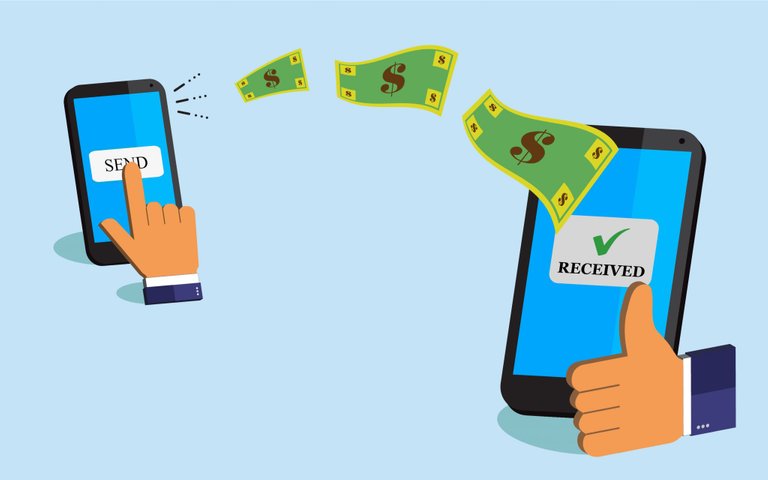
If you’re interested in holding a cryptocurrency that is fuelling the disruption of a legacy financial services industry and being part of community that is working towards improving the lives of people in the real world, read on.
Simple Overview of The Complex Remittance Industry

A remittance is a transfer of money by a foreign worker to an individual in his or her home country. The money sent is vital to the livelihood of the receivers in developing nations as it is mainly used for basic living expenses such as shelter, food, clothing and education. For some developing countries with many of its citizens working abroad, these cross-border transfers are one of the largest sources of capital inflow. At a global level, the World Bank estimates that remittances to developing countries amounted to $444 billion in 2017 and is expected to grow to $466 billion in 2018.
While sending money across borders sounds straightforward enough, in reality the process is slow, expensive and weighed down by regulatory burden – all the hallmarks of a legacy financial services industry. This has implications for both individuals sending money back home and the local business that offer the service.
The Challenge for Individuals

Around 2 billion people worldwide across developing nations do not have access to bank accounts and services. Instead, they deal with cash and rely upon Money Transfer Operators (MTOs) or mobile payments to send and receive money. Money that is sent abroad in one local currency and cashed out in the local currency of the destination point will go through a chain of different banks and services. During the process, the money changes hands many times and customers are charged every step of the way making remittances an expensive way to send money back home.
The Challenge for MTOs

MTOs are non-bank financial providers of over the counter cash payments and have extensive networks of agents in cities and rural areas. Local entrepreneurs that want to set up their own MTO are immediately faced with regulatory burdens and the challenge of clicking into extensive global pay out networks. Often this is beyond the financial capacity of the entrepreneur leaving them no choice but to join an existing money transfer network and outsourcing most of the requirements to a multinational, which commonly takes a generous 80% cut of transaction fees. To make matters worse, established MTOs are losing their bank accounts from banks seeking to disengage from the industry.
This all boils down to an industry with high regulatory pressure and too many intermediaries charging high commissions. The global average cost of sending $200 is 7.2% and Western Union doesn’t shy away from the occasional 15% charge for exotic currency pairings. This means a reduction of costs in cross-border payments by 5% would have saved everyone roughly $22 billion in 2017. That’s a lot of zeroes wasted on unnecessary processes and the perfect target for cryptocurrency disruption.
Project Zephyr: Unleashing Cryptocurrencies to Empower MTOs

Project Zephyr is part of Bitspark’s growth plan for a global remittance network that lowers barrier to entry for local entrepreneurs and democratizes access to money transfer services for the 2 billion unbanked citizens worldwide. The goal is to remove the reliance on banks in the money transfer industry and provide new opportunities to MTOs in any jurisdiction working with any currency in the world. MTOs already have recurring customers who rely on them as their cash in cash out gateway, making them a critical piece in unleashing the cryptocurrencies designed to redefine the remittance industry.
To revolutionize the remittance industry, we will roll out 180+ fiat pegged cryptocurrencies via the BitShares Blockchain to create a global decentralized remittance network that is faster, cheaper and more reliable than anything else seen before. MTOs, senders and receivers exchange money moving between fiat currencies and cryptocurrencies pegged to fiat currencies. This enables MTOs to run their business on the Bitspark remittance platform without the need for a bank account and completely bypasses the challenges associated with accessing liquidity denominated in the local currency. In the end, transaction costs will be reduced drastically with the savings being passed on to the senders and receivers.
Fuelling Global Growth with the Zephyr Token
Zephyr Tokens are an integral part of Project Zephyr and are designed to fuel the growth of a new global remittance network with MTOs and individuals signing up to Bitspark’s services. To circulate Zephyr, users will be rewarded for a range of activities including sending transactions, topping up balances or liquidating balances. To apply a recurring upward price pressure, Bitspark uses 25% of each transaction fee to buy back Zephyr from the BitShares DEX.
With these mechanisms, Zephyr is part of a positive feedback loop between network growth, activity and upward token value where each element fuels the other. Zephyr acts as an incentive for MTOs and individuals to join and transact on the network. In other words, the value and circulation of Zephyr is directly tied to the success of the global Bitspark network.
That network is growing fast as our services don’t require bank accounts making the barrier to entry is very low. We already cover eight countries in the Asia Pacific and African regions including Hong Kong, Malaysia, Ghana, Nigeria, Philippines, Indonesia, Vietnam and Pakistan.
In collaboration with the United Nations Development Program, the next country to be added is Tajikistan. A country with limited banking infrastructure, high internet and mobile penetration and a heavy reliance on remittances that makes up around 30% of its GDP. Tajikistan proves the global accessibility of our redefined remittance network, and the real world need for individuals to access money transfer services without relying on banks.
The Zephyr community
Project Zephyr will cause a seismic shift that empowers local entrepreneurs in the benefit of senders and receivers of money worldwide. Investors holding Zephyr are part of a global community that believes in that message. They love the idea of all world currencies on one system and they know the gentle Zephyr breeze is about to kick up a storm.
Subscribe to our newsletter to get the last update of Bitspark and cryptocurrency world: https://mailchi.mp/bitspark.io/zephyr...
Bitspark Homepage: https://www.bitspark.io
Bitspark Blog: http://blog.bitspark.io/
Bitspark Twitter: https://twitter.com/BitsparkLTD
Bitspark Facebook: https://www.facebook.com/BitsparkLTD
Zephyr Telegram Group:https://t.me/joinchat/BQS59kQMk8bL74v...
Sounds like a good project !
So cool that you have partnership with such institution as the United Nations Development Programme !
Working with the UNDP to power remittances in Tajikistan has been an incredible project so far with more developments to come. Tajikistan is a country which provides proof that if Bitspark can work there, it can work world wide without banks and with crypto.
Informative, followed. Thanks for the update!
Cheers. We'll be posting much more in the future.